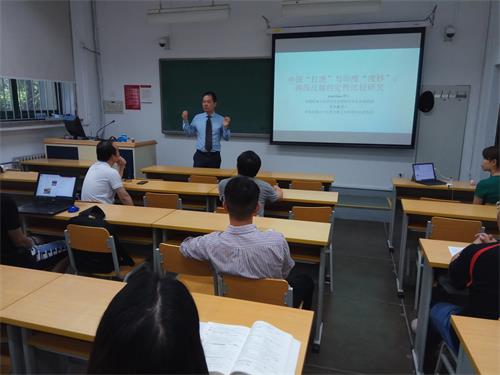 Research Update
Research Update
22
JuneOn the afternoon of June 19, 2018, the tenth issue of the “New Political Economic Frontier” Lecture Series sponsored by the Center for Research on Government-Enterprise Relationship and Industrial Development, NADS, was held at the room 2115 in the No.2 public teaching building. Wu Muluan, associate professor of the Lee Kuan Yew School of Public Policy at the National University of Singapore, was invited to give a lecture on the topics of "Tiger fighting in China" and "discarded money" in India: Qualitative comparative study of anti-corruption between the two countries. The lecture was chaired by Ma Liang, Assistant to Dean of NADS and Research Fellow, and Professor Nie Huihua, Deputy Dean of NADS acted as commentator.

Prof Wu Muluan made a lot of achievements in anti-corruption research. In this lecture, he introduced the latest research results that he and his Indian colleagues have jointly completed. He believes that if we want to compare the effectiveness of anti-corruption, we must select countries at the same stage of development. China and India are the two most important developing countries in the world. The two countries have their own merits in anti-corruption and are worthy of comparison and mutual understanding. Through structured interviews, he and his collaborators have mastered the perceptions of anti-corruption among government officials of China and India, and have come up with different processes and results of anti-corruption.
Their research shows that both China and India have strengthened their anti-corruption efforts in recent years and have achieved remarkable results. India, under the leadership of Prime Minister Modi, has cracked down on corruption and “rob the rich for the poor” by “disposing of money” to decrease India’s prices and benefit the people. China undertook an anti-corruption storm under the leadership of General Secretary Xi Jinping. By using the “tiger fight” approach to shake down the corrupt elements and cleanse the ranks of officials, it also achieved immediate results.
He also put forward his own views on China’s anti-corruption in the future. He believes that China's advantage lies in the organization of anti-corruption organizations, while India is institutionalized and legalized. In the future, China should pay more attention to institution building and avoid the influence of informal institutions and rules. In addition, it is necessary to strengthen information disclosure and citizen participation, improve the transparency of the public sector, and grasp anti-corruption education from a young age to reduce people’s tolerance for corruption.
Professor Nie Huihua, Deputy Dean of NADS made a wonderful comment on the lecture. He believed that the research on Sino-Indian comparison was of great benefit and worthy of further exploration and promotion. A number of media representatives and university teachers and classmates attended the meeting and conducted in-depth communication and exchange with Prof. Wu Muluan.